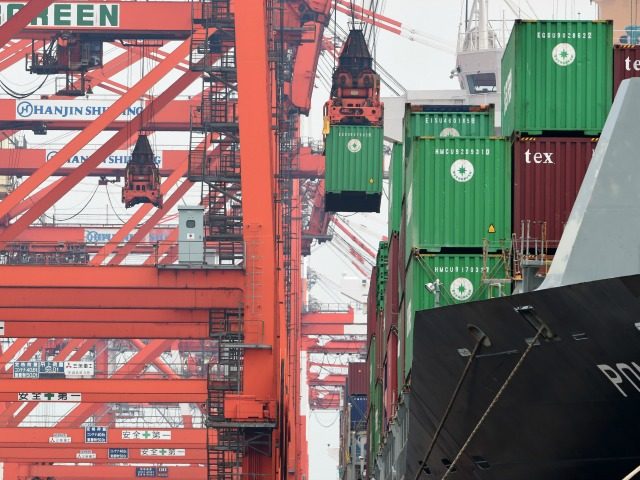“Oh, no, a trade war,” moaned the Republican establishment for the umpteenth time recently, as Donald Trump suggested a 35 percent tariffs on goods made in U.S. factories that have moved offshore.
“Tariffs?” it seemed to ask. “You’ll start a trade war…destroy global supply chains…hurt the very American companies and workers you want to help…The sky is falling!”
Apparently, President-elect Trump’s call for tariffs on outsourced U.S. manufacturing goods is a bridge too far for editorial boards, business journalists, pundits, and even new friends like Rep. Paul Ryan (R-WI). The House Speaker says that, rather than revamping faulty U.S trade policy, the solution for America’s manufacturing woes is simply to enact “comprehensive tax reform.”
It’s a view shared by other GOP stalwarts, including Sen. Mitch McConnell (R-KY), Rep. Kevin McCarthy (R-CA), and the Club for Growth’s David McIntosh. According to McIntosh, tariffs and trade wars would make the U.S. economy “tank again.” Instead, the prescription to him is obvious: “Tax cuts and deregulation.”
Here’s the problem with this predictable, longstanding GOP remedy for our trade problems: It just won’t work.
The foreign trade stratagems put in place to hinder America’s exports have simply grown too voluminous and complex to surmount simply by lowering the corporate tax rate and cutting regulations.
China’s illegal export-boosting policies are a prime example, although Beijing is far from alone in the trade cheating category. Since its 2001 entry into the World Trade Organization (WTO), China’s trade surplus with the United States has climbed by $284 billion.
Why? Because Beijing has based its export-led growth on predatory practices such as currency manipulation, massive subsidies, and large-scale dumping of industrial commodities like steel. Significantly, these tactics violate Beijing’s WTO and IMF commitments. But, to date, the United States simply hasn’t found the political will to enact the broad array of policies needed to counter Chinese cheating. The occasional WTO lawsuit is hardly an adequate response.
It would be humorous, if it weren’t so distressing, to hear otherwise intelligent Republicans warn of a coming trade war—when the United States has already been suffering the ill effects of one-sided attacks for the past 40-plus years.
Certainly, the recent toll is obvious—with millions of U.S. manufacturing jobs lost to China and other competitor nations since 2001. And so it’s strange that House Republicans would fear reprisal when so much damage has already been inflicted, and it is the U.S. that needs to retaliate to preserve its manufacturing base.
There is one area, however, where Republicans may finally be seeing the proverbial light, and that involves the issue of a Value Added Tax (VAT). Currently, the United States is the only major industrialized nation not to employ a VAT system. As a consequence, foreign VAT taxes not only impose a surcharge on U.S. exports to a VAT country but also subsidize that country’s producers with rebates for their own exports. They do so legally under trade rules, while America has chosen to take it on the chin rather than respond.
Notably, these foreign VAT systems amount to a stealth tax on American-made goods. And, when combined with the egregious currency manipulation and rampant subsidies practiced by countries including China and Japan (which also employ VATs), it builds an enormous protective wall against U.S. exports.
The challenges posed by the current, tilted VAT system seem to have finally reached even ardent free-traders like Paul Ryan, though. The House speaker’s recent Blueprint for Tax Policy, co-authored with Rep. Kevin Brady (R-TX), recognizes that America’s “major trading partners raise a significant portion of their tax revenues through value-added taxes.” The two conclude that the overseas VAT system imposes a “unilateral penalty on U.S. exports” while also providing a “unilateral subsidy” on imports.
This realization is a major step forward for Republicans: Ryan, Brady, and others finally grasp the competitive advantages bestowed by a VAT system and understand that the U.S. must counter it to be competitive in world markets. Specifically, their blueprint calls for a consumption-based, border-applicable tax/rebate system allowing the United States to “counter the border adjustments that our trading partners apply in their VATs.”
Correcting the VAT inequity won’t solve all of the challenges facing U.S. exporters, but it’s a significant start—and one that can help to bring revenue into the federal treasury without saddling domestic businesses. Of course, there are already howls that the Republican proposal may be illegal under WTO trade rules, but these should not deter the Republicans from moving forward. Let’s legislate now, then litigate later at the WTO, if necessary.
Ryan and his colleagues should be commended for forward thinking. The next step for the Republican Congress and President Trump is to design, pass, and sign legislation codifying the initiative. With potentially sweeping changes afoot in U.S. competitiveness policy, it’s entirely possible that such a tax system could be enacted, along with other measures—with penalizing currency manipulation chief among them—to rebalance trade flows, advantage U.S. manufacturers, and fulfill the president-elect’s promise to restore lost middle class jobs.
Kevin L. Kearns is president of the U.S. Business & Industry Council, a national business organization advocating for domestic U.S. manufacturers since 1933.

COMMENTS
Please let us know if you're having issues with commenting.